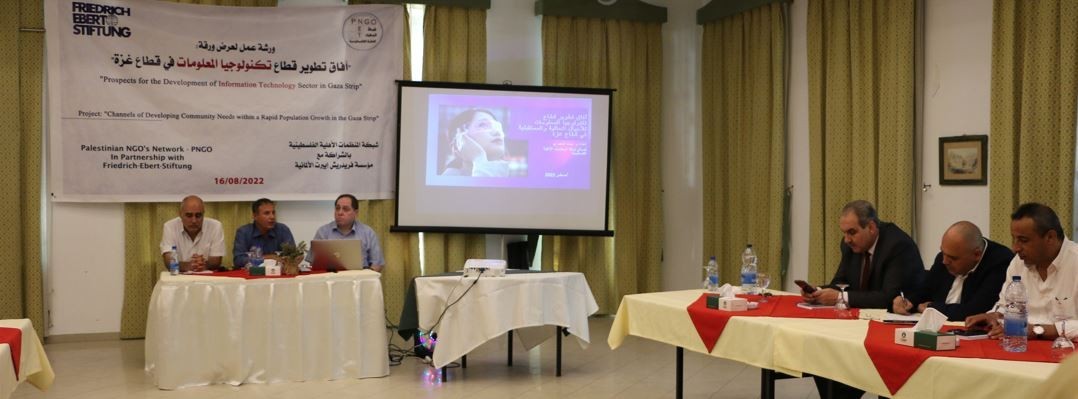Representatives of various local society organizations and private sector's institutions in Gaza emphasized on the need for developing infrastructures of the 'information economy', in a way that would make all advanced and safe telecommunication networks capable of best serving various services and industrial sectors.
The representatives' call came during a workshop, held by the Palestinian Non-governmental Organizations Network (PNGO) in Gaza city.
They also called for promoting the private sector, business incubators and all other civil society organizations to develop their technological infrastructures and related policies for raising the awareness of local community, all within a comprehensive scheme.
During the workshop, in which Mr. Emad Al-Masri, presented a paper, titled "Prospects of developing information technology sector in the Gaza Strip”, within the project "Channels of Developing Community Needs within a Rapid Population Growth in the Gaza Strip", in partnership with Friedrich-Ebert-Stiftung, participants asserted on the significance of the linking university majors and the local labor market, , increasing pioneering technological disciplines and developing educational curricula with regard to practical training in technological and software disciplines.
Amjad Shawa, Director of PNGO, delivered an opening speech in which he explained that Information Technology and Telecommunications (ICT) sector, has increasingly become one of the main Palestinian economic sectors. Noting that any development in this sector is positively reflected in technological development in other sectors. He also pointed out that there is a large and growing trend among other economic sectors to computerize their operations and benefit from IT applications and solutions.
He pointed out that the ICT sector has been growing in the Gaza Strip, as many thousands of job seekers have turned to the sector.
PNGO's director hinted at the point that the ICT was the less-affected sector, during the Covid-19 pandemic over the past couple of years, given the fact that all ICT-related operations can be done remotely and without physical contact, among various staff.
Al-Shawa stressed that this sector has flourished due to the resort of other economic sectors to search for technological solutions, and accordingly, the demand for Internet services, e-learning, e-commerce, e-marketing, web services, and others has increased.
From his part, Programs Manager with Friedrich Ebert Stiftung, Dr. Usama Antar, said that " the partnership with PNGO this year, has helped set forth several indicators for a better future for the Gaza Strip"
Antar also asserted that ICT is now one of the most significant sectors, across developing countries, through which these countries aim at improving economic conditions of their peoples.
"It has been noted that majority of Palestinian universities have unfortunately burdened students and their families with educational requirements that could be replaced with other ICT-related subjects, which in turn can make a difference in the future of university graduates", Antar further explained.
From his part, Emad Al-Masri presented a study in which he addressed the development of information technology in Palestine including various ICT-related issues, such as chances of developing information technology for current and future youth generations, amidst rapid population growth, as well as role of business incubators in creating some more job opportunities.
Al-Masri's study also asserted that ICT is a promising sector, locally and internationally, as it can create tens of thousands of jobs for Palestinian university graduates, mainly in the Gaza Strip.
He further made clear that in order to help ICT better contribute to improvement of local economy, there needs to be frameworks and incubators for information technology. Once such entities are available, less rates of both unemployment and poverty can be seen, especially when both the private sector and the NGOs cooperate.
He pointed out that the response by the educational system to local and outside markets' needs is being very slow. According to Al-Masri, such a slow response is being reflected in the high rate of jobless university graduates, at local and international levels.
Al-Masry explained that the skills needed to succeed as an IT specialist change faster than any other field of work, creating an IT skills gap when the demand for manpower for a particular job role in the IT field exceeds the supply of qualified professionals.
He emphasized on the need to allocate funds for developing information technology at both private and public sectors. The funding should include building capacities of those working in the field, and to follow up such development on a semi-annual basis. The adoption of this strategy will significantly provide qualified cadres that are always responsive to the local, regional and international market.
Almasri called on local civil society organizations to go for digital transformation, so that they can better serve their beneficiaries.
He also called for coordination between the business incubators and the private sector so they can be partners in the development process and not a competitor. Further, he called on to advocate for allocating governmental support for business incubators, and facilitating lending and financing programs for new projects.
Participants of the workshop presented their own recommendations and notes for the best of ICT in the Gaza Strip. Among their thoughts was holding a one-week-long exhibition for Technology Entrepreneurship works.
They emphasized on the need for raising the community's awareness towards the significance of ICT, including ICT education and training, entrepreneurial business as well as its economic advantage.
Participants also called for developing scientific research policies and programing experimentation, with the help of advanced computer laboratories, so that researchers, students and other ICT-related staff are involved in substantial useful training.
Eventually, participants called on both the private and public sectors to support works incubators, so that the information technology sector can be further promoted.




